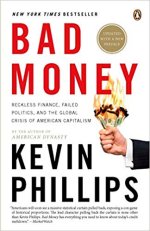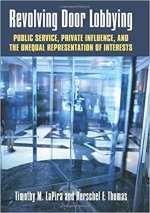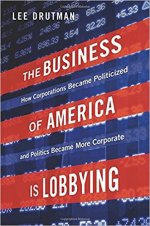Crony Capitalism / Rent-Seeking / Corporate Welfare / Revolving Door
Corporate welfare refers to subsidies and regulatory protections that lawmakers confer on certain businesses and industries. When considering budget issues, federal policymakers are supposed to have the broad public interest in mind. Unfortunately, that is not how the federal budget process usually works in practice. Many federal programs are sustained by special-interest groups working with policymakers seeking narrow benefits at the expense of taxpayers and the general public. Cato
If you want to look at the welfare for the rich and corporations, start with the federal Internal Revenue Code. That is the King James Bible of welfare for the rich and corporations. Special breaks in the tax code are the reason that there are thousands of lobbyists in the halls of Congress, hundreds of lobbyists around each state legislature and tens of thousands of tax lawyers all over the country.
Ten Examples of Welfare for the Rich and Corporations, by Bill Quigley, March 16, 2014, HuffPo
Giving Away Money Costs More Than You Think
[C]corporate welfare often subsidizes failing and mismanaged businesses and induces firms to spend more time on lobbying rather than on making better products. Instead of correcting market failures, federal subsidies misallocate resources and introduce government failures into the marketplace.
While corporate welfare may be popular with policymakers who want to aid home-state businesses, it undermines the broader economy and transfers wealth from average taxpaying households to favored firms. Corporate welfare also creates strong ties between politicians and business leaders, and these ties are often the source of corruption scandals in Washington. Americans are sick and tired of “crony capitalism,” and the way to solve the problem is to eliminate business subsidy programs.
Corporate welfare doesn’t aid economic growth and it is an affront to America’s constitutional principles of limited government and equality under the law. Policymakers should therefore scour the budget for business subsidies to eliminate. Budget experts and policymakers may differ on exactly which programs represent unjustified corporate welfare, but this study provides a menu of about $100 billion in programs to terminate.
“Corporate Welfare in the Federal Budget,” by Tad DeHaven, Cato, July 25, 2012
Capitalism v. Cronyism: Why Can’t You Buy a Tesla in Utah?
Wholesale crony capitalism is a particularly worrisome form of cronyism, not only because of its broad scope, but also because it ossifies existing power structures and political equilibria. Unions, particularly teachers’ unions, are steadfast supporters of leftist politicians, who, in turn, pay for that support with taxpayer dollars by protecting unionized teachers from having to worry about the quality of their performance on the job in the classroom.
The Rise Of Crony Capitalism, by Jonathan Macey, February 11, 2016, Hoover
What are some examples of crony capitalism? Quora
Corruption, Rent Seeking and Multiple Equilibria
- Rural Business-Cooperative Service, USDA
- Market Access Program, USDA
- Emerging Markets Program, USDA
- Foreign Market Development Program, USDA
- Export-Import Bank
- Overseas Private Investment Corporation (OPIC)
- Small Business Administration
- Commerce Department’s Economic Development Administration
- Department of Housing and Urban Development’s Community Development Block Grants
- Appalachian Regional Commission
- Rural Utilities Service (once the Rural Electrification Administration), USDA
- Bureau of Land Management
- Foreign Military Financing
- Jones Act
- Solyndra
- Energy Department grants and financing
- Advanced Technology Vehicles Manufacturing, DoE
- U.S. Trade and Development Agency
- U.S. Maritime Administration, DoT
What is Crony Capitalism?
Congress created the usual special interest frenzy with its latest iteration of the farm bill. Agricultural subsidies are one of the most important examples of corporate welfare—money handed out to businesses based on political connections. The legislation suffered a surprise defeat in the House, being viewed as too stingy. But it is certain to return.
Fiscal responsibility is out of fashion. The latest federal budget, drafted by a Republican president and Republican-controlled Congress, blew through the loose limits established under Democratic President Barack Obama. The result is trillion-dollar deficits as far as the eye can see.
Spending matters. So does the kind of spending. Any amount of corporate welfare is too much.
Business plays a vital role in a free market. People should be able to invest and innovate, taking risks while accepting losses. In real capitalism there are no guaranteed profits. But corporate welfare gives the well-connected protection from many of the normal risks of business.
. . .
While corporate welfare suggests money for big business, firm size is irrelevant. There is no substantive difference between, say, the Small Business Administration and the Export-Import Bank. Both turn capitalism into a rigged game of Monopoly.Aid comes in many forms. There is spending, typically in grants, loans, and loan guarantees; limits on competitors, such as tariffs and quotas; tax preferences, attached to broader tax bills to benefit individual companies and industries. All help ensure business profits.
“Corporate Welfare Lives on and On,” by Doug Bandow, Cato, August 29, 2017
LSE Research: Washington’s Revolving Door
Revolving Door
Although the influence powerhouses that line Washington’s K Street are just a few miles from the U.S. Capitol building, the most direct path between the two doesn’t necessarily involve public transportation. Instead, it’s through a door—a revolving door that shuffles former federal employees into jobs as lobbyists, consultants and strategists just as the door pulls former hired guns into government careers.
Revolving Door, from OpenSecrets
Related Books
More
- STOCK Act / Stop Trading On Congressional Knowledge Act (CongressionalGlossary.com)
- K Street / Gucci Gulch (CongressionalGlossary.com)
- Campaigns and Elections: Heaven and Hell Edition
- Revolving Door, from OpenSecrets
- Government Accountability Institute (GAI)
- Corruption Chronicles – from Judicial Watch
- “The seven stages of the office seeker“
- Citizens Against Government Waste (CAGW) Pig Book
- “The Network for Manufacturing Innovation,” CRS Report R43857 (21-page PDF
 )
) - “Human Rights in China and U.S. Policy,” CRS Report RL34729 (46-page PDF
 )
) - “Export-Import Bank: Frequently Asked Questions,” CRS Report R43671 (80-page PDF
 )
) - “Export-Import Bank: Overview and Reauthorization Issues,” CRS Report R43581 (49-page PDF
 )
) - “International Trade and Finance: Overview and Issues for the 115th Congress,” CRS Report R44717 (64-page PDF
 )
) - “Agricultural Exports and 2014 Farm Bill Programs: Background and Current Issues,” CRS Report R43696 (33-page PDF
 )
) - “The Opportunity Cost of Corporate Welfare,” by Matthew D. Mitchell and Tamara Winter, Mercatus, May 22, 2018
- “The Overseas Private Investment Corporation: Background and Legislative Issues,” CRS Report 98-567 (33-page PDF
 )
) - “Post-Employment, ‘Revolving Door,’ Laws for Federal Personnel,” CRS Report R42728 (20-page PDF
 )
) - “Ethics Pledges and Other Executive Branch Appointee Restrictions Since 1993: Historical Perspective, Current Practices, and Options for Change,” CRS Report R44974 (38-page PDF
 )
) - “The Lobbying Disclosure Act at 20: Analysis and Issues for Congress,” CRS Report R44292 (49-page PDF
 )
) - “Status of a Senator Who Has Been Indicted for or Convicted of a Felony,” CRS Report RL34716 (16-page PDF
 )
) - “Status of a Member of the House Who Has Been Indicted for or Convicted of a Felony,” CRS Report RL33229 (16-page PDF
 )
) - “Prosecution of Public Corruption: An Overview of Amendments Under H.R. 2572 and S. 401,” CRS Report R42016 (29-page PDF
 )
) - “Prosecution of Public Corruption: An Overview of Amendments Under H.R. 2572 and Title II of the STOCK Act,” CRS Report R42016 (30-page PDF
 )
) - “Executive Branch Service and the “Revolving Door” in Cabinet Departments: Background and Issues for Congress,” CRS Report R45946 (25-page PDF
 )
) - “Government for Rent,” by Christopher C. Horner, CEI, September 11, 2018
- “Federal Deficits, Growing Debt, and the Economy in the Wake of COVID-19,” CRS Report R46729 (24-page PDF
 )
) - The Economic Effects of Financing a Large and Permanent Increase in Government Spending, Congressional Budget Office, CBO Working Paper 57201, March 2021 (42-page PDF
 )
) - “A National Disgrace: The federal budget process threatens America’s future.” By John Steele Gordon, City Journal, February 19, 2021
Courses
- Congressional Operations Briefing – Capitol Hill Workshop
- Drafting Federal Legislation and Amendments
- Writing for Government and Business: Critical Thinking and Writing
- Custom Training
- Congressional Operations Poster, with Federal Budget Process Flowchart
- Federal Budgeting, a Five-Course series on CD
- Congress, the Legislative Process, and the Fundamentals of Lawmaking Series, a Nine-Course series on CD
Publications

The Federal Budget Process 2E |

Pocket Constitution |

Citizen’s Handbook to Influencing Elected Officials: A Guide for Citizen Lobbyists and Grassroots Advocates |

Congressional Procedure |
CongressionalGlossary.com, from TheCapitol.Net
For more than 40 years, TheCapitol.Net and its predecessor, Congressional Quarterly Executive Conferences, have been teaching professionals from government, military, business, and NGOs about the dynamics and operations of the legislative and executive branches and how to work with them.
Our custom on-site and online training, publications, and audio courses include congressional operations, legislative and budget process, communication and advocacy, media and public relations, testifying before Congress, research skills, legislative drafting, critical thinking and writing, and more.
TheCapitol.Net is on the GSA Schedule, MAS, for custom on-site and online training. GSA Contract GS02F0192X
TheCapitol.Net is now owned by the Sunwater Institute.
Teaching how Washington and Congress work ™









